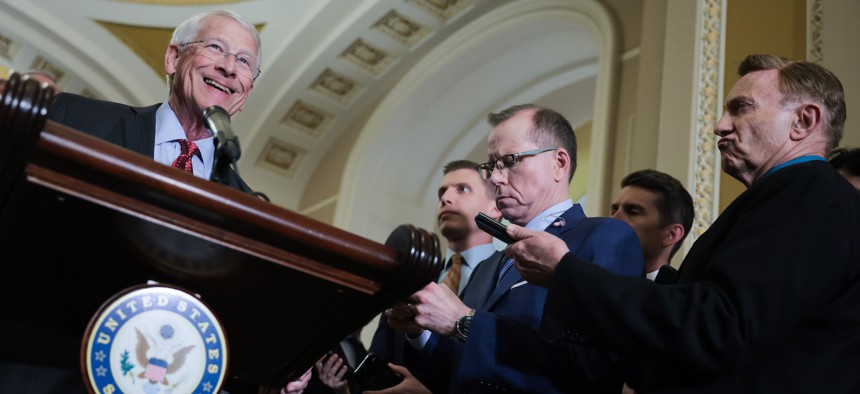
Over the past few weeks, House and Senate leadership have been able to advance President Trump’s “one big, beautiful reconciliation bill” and brought us closer to delivering the reforms we promised the American people. Amid the negotiations, Republicans have not lost sight of what this bill is: a once-in-a-generation chance to lock in pro-growth tax rates, secure the border, and rebuild the military. It is icing on the cake that we will roll back Green New Deal spending and repeal much of the misleadingly named Inflation Reduction Act.
Many of the 2017 tax cuts expire at the end of this year. That has created a shot clock for the entire legislative effort, compelling quick action on the equally urgent defense portions. Last month, we met with the president in the Oval Office, and the three of us agreed: This reconciliation bill’s military investments are a crucial down payment on President Trump’s ambitious peace through strength agenda.
Shortly after our meeting, the president announced the next steps of his transformative $175 billion Golden Dome initiative. Our bill contains $25 billion to jump-start this missile defense system, which will shield our homeland and troops against ballistic, cruise, and hypersonic missiles.
Similarly, our defense industrial base needs a wholesale rebuilding. Our bill contains more than $25 billion to refill our munitions stockpiles, adopt advanced manufacturing techniques, and fully implement the president’s executive order to rebuild our critical minerals supply chain. Weapons of war are changing rapidly, so we directed $16 billion to adopt commercial technology at scale and field the low-cost, expendable systems and artificial intelligence that characterize the modern battlefield.
The nation’s nuclear arsenal and Air Force fleet are in urgent need of long-overdue upgrades. This bill devotes $14 and $9 billion, respectively, to help modernize them. We also will build on President Trump’s border security wins, sending an immediate $1 billion to grow the Pentagon’s logistics and personnel support mission along the border.
In his address to a Joint Session of Congress, the president promised a shipbuilding revival. The American maritime enterprise will take time to spring to life, and we have set aside $29 billion to help jumpstart the industrial base. The funds will boost production of traditional ships and submarines while making a historic investment to start mass-production of unmanned vessels. That naval power will increase American muscle in the Pacific. Our bill will complement that by devoting $12 billion to the capabilities and infrastructure Adm. Samuel Paparo, our commander in the Pacific, desperately needs.
Service members also will directly benefit from this bill. An infusion of $10 billion dollars will go to paychecks and allowances as well as improving housing, healthcare, and assistance to military families. The reconciliation bill will also provide $14 billion for basic readiness, improving infrastructure at depots and shipyards, and expanding the military’s inventory of spare parts for repairs and maintenance.
Savvy readers will have already summed these figures and arrived at the defense investment of $150 billion. That is the cost of years of neglect. It will take several years of sustained investment and real growth beyond this down payment to keep pace with China’s military advances. Completing the Golden Dome alone will cost another $150 billion. But to be clear: The cost of deterring war will always be dwarfed by the cost of fighting one.
National defense can’t be done on the cheap. But as we spend more, we will spend smarter. Our bill requires Defense Secretary Pete Hegseth to audit the way officials use the reconciliation funds, and we will work hand in glove with Pentagon officials to ensure every dollar is spent in the right place. It also injects automation and artificial intelligence into the Pentagon’s accounting process to help achieve a clean audit by 2028.
As the Chairmen of the Senate and House Armed Services Committees, we can confirm that there is more reform to come. We are working on legislation, including the FORGED Act and SPEED Act, to initiate a major reform of Pentagon acquisition and innovation processes—the most significant changes in 40 years.
We contend the Biden administration was asleep at the wheel as the world’s worst dictators caused chaos in Europe, the Middle East, Asia, and even our southern border. President Trump and Congressional Republicans understand that American hard power can deter these adversaries from growing more aggressive and threatening the United States directly. But we must act now to build that kind of power in time. This bill is the necessary first step toward achieving that peace through strength.
Sen. Roger Wicker, R-Miss., is chairman of the Senate Armed Services Committee. Rep. Mike Rogers, R-Ala., is chairman of the House Armed Services Committee.
The post Defense reconciliation bill begins rebuild and transformation of our military appeared first on Defense One.




